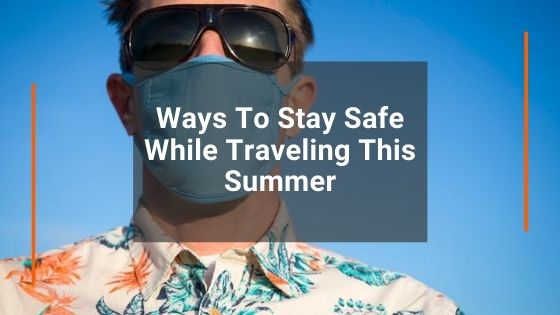Ways To Stay Safe While Traveling This Summe

Published on
Safety First
Research shows that confidence is growing and Americans are ready to travel again this summer. However, summer vacations will look slightly different in the time of COVID-19. Fortunately, there are many ways to protect yourself and others and travel safely and responsibly this summer. Here’s some notable expert advice to consider before you leave home.

Get Vaccinated Against COVID-19
According to the Centers for Disease Control and Prevention (CDC), “People who are fully vaccinated with an FDA-authorized vaccine or a vaccine authorized for emergency use by the World Health Organization can travel safely within the United States” as they are “less likely to get and spread COVID-19.” The agency points out that fully vaccinated travelers—two weeks after receiving the second dose of the Moderna or Pfizer vaccine and two weeks after receiving the single dose of the Johnson & Johnson vaccine—do not need to get tested before or after travel unless their destination requires it nor do they need to self-quarantine. However, fully vaccinated travelers should still continue to follow other COVID-19 precautions such as wearing a mask, maintaining six feet of distance from others and avoiding crowds, and washing or sanitizing their hands often.

Get Tested for the Virus
If you are unvaccinated, the CDC recommends taking a viral test 1-3 days before your trip and testing again 3-5 days after travel. If you test positive before your trip you should stay home and postpone any travel plans. Unvaccinated travelers are also advised to stay home and self-quarantine for a full seven days after travel even if they test negative.

Wear a Mask
“Wearing masks that completely cover the mouth and nose reduces the spread of COVID-19,” the CDC maintains. “People who never develop symptoms (asymptomatic) or are not yet showing symptoms (pre-symptomatic) might not know that they are infected but can still spread COVID-19 to others,” the agency adds, noting that masks also offer protection to the wearer. The CDC has issued an order requiring travelers to wear masks that completely cover both the mouth and nose while awaiting, boarding, disembarking, or traveling on airplanes, ships, ferries, trains, subways, buses, taxis, and ride-shares when traveling into, within or out of the U.S. Refusing to comply could end your trip prematurely or even get you banned from flying your favorite airline.

Keep Your Distance
In addition to wearing a mask when around others, travelers should stay at least six feet or about two arm lengths from other people who are not from their household both indoors and outdoors. “COVID-19 spreads mainly among people who are in close contact (within about 6 feet) for a prolonged period,” the CDC states. “Spread happens when an infected person coughs, sneezes, or talks, and droplets from their mouth or nose are launched into the air and land in the mouths or noses of people nearby. The droplets can also be inhaled into the lungs.” Physical distancing is an important safety measure but the agency notes that it should be practiced in combination with other preventive actions.

Wash, Sanitize Your Hands
The CDC advises washing your hands with soap and water whenever possible as it reduces the number of germs and harmful chemicals on your hands. If that’s not an option, however, travelers should use a hand sanitizer with at least 60 percent alcohol to combat potentially harmful germs and viruses they may encounter over the course of their trip.

Pack Sanitizing Wipes
Sanitizing wipes are a quick and easy way to disinfect frequently touched surfaces that you’re likely to come into contact with during your summer travels such as airplane tray tables, rental car cabins, and hotel room doorknobs and remotes, among others. Some airline travel kits and complimentary hotel offerings include wipes but you can pack your own to ensure you’re prepared.

Take Care of Your Immune System
Looking after your immune system is key to ensuring that you stay safe even when germs and viruses do make their way into your body so be sure to eat plenty of nutritious foods, make time for exercise and get plenty of sleep when you travel. Part of staying healthy is finding time to relax and indulge from time to time so be sure to get outdoors for some vitamin D (wear sunblock of course) and unplug from work or home life when you can to destress.





